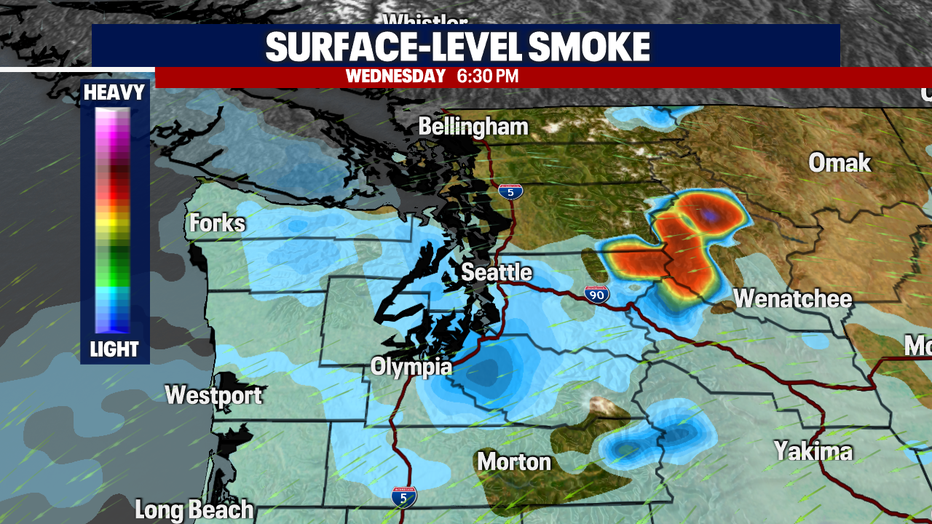Wildfire smoke: How to protect yourself, your home from hazardous air quality

UW Medicine experts explain health concerns surrounding wildfire smoke
UW Medicine Pulmonologist Dr. Cora Sack shares helpful information about the dangerous health impacts of breathing in wildfire smoke, and how to make sure the poor air quality caused by the smoke doesn't enter your home.
Wildfire smoke from the Bolt Creek Fire has returned in full force, blanketing hazardous air over the Puget Sound region. Breathing in this type of air is unhealthy, and experts at the University of Washington have shared some helpful information to prevent smoke from getting inside your home.
At 11:00 a.m. on Wednesday, the air quality index (AQI) for downtown Seattle reached 158. To put that number into perspective, breathing in that kind of air for 24 hours is equivalent to smoking 3.57 cigarettes, according to the AQI to Cigarettes Calculator.

According to FOX 13 Brian MacMillan's smoke forecast, surface level smoke will push south later this afternoon, which means Snohomish and King counties will see better air quality as the day goes on. However, Pierce County will see worsening air quality heading into Wednesday evening. The winds shift to westerly early Thursday, which will push the smoke out of the Puget Sound area and into Central and Eastern Washington.
UW Medicine Pulmonologist Dr. Cora Sack says people should plan ahead, rather than wait for the sky to turn hazy.
"Have a plan for what to do if the days get smoky. So really knowing where you can go to get safe air quality and what to do to prepare your home and maybe talk to your doctor as well about what to do if you're experiencing any health effects," says Dr. Sack.
PREPARING YOUR HOME FOR SMOKY AIR
Dr. Sack says there are various things you can do to help improve your home's air quality, in addition to closing your doors and windows.
GET THE FREE FOX 13 SEATTLE WEATHER APP FOR WEATHER ALERTS IN YOUR NEIGHBORHOODS
"If you have central air conditioning, putting your air on recirculate and making sure you have a good quality filter, that will really take out those particles from the air," says Dr. Sack. "If you don't have central air, you can get a portable air filter. And I really recommend a HEPA filter that mechanically removes particles and doesn't generate ozone or other harmful byproducts. And then finally, you can make your own filter by using a box fan and putting a filter on top of it."
The state Department of Ecology shows us how to DIY a box fan filter in this YouTube video to improve indoor air quality in a single room.
SIGNS THAT THE AIR QUALITY IN YOUR HOME IS POOR
If smoke enters your apartment, but is not clearly visible, your body will tell you.
"It's very common for the irritating gases and the particulates in smoke to cause some health effects in even normal people, and that could be burning or itchy eyes, sore throat, headaches, a little bit of nausea – and that should really be a sign to stop what you’re doing and get in clean air," says Dr. Sack.
HOW TO PROTECT YOUR BODY FROM POOR AIR QUALITY
"I know we've all gotten very used to wearing masks this past year for protecting us against COVID transmission," says Dr. Sack. "Unfortunately, those cloth masks that we use for COVID aren't effective at filtering out the smallest particles that are dangerous from wildfire smoke. You can consider doing things like wearing a tight-fitting and N95 mask to help protect you. To be really effective, it needs to be again, fit tested. So, it fits your face appropriately and really can filter out the particles and has a tight seal."
RELATED: Bolt Creek Fire near Skykomish 79% contained; US 2 remains closed
WHO IS AT RISK?
"The groups that are most susceptible to the health effects of wildfire smoke include the elderly or those over the age of 65, people with underlying health conditions like lung or heart disease, pregnant women and infants."
"If you’re a sensitive population, you may experience more severe symptoms and health effects, and that could include difficulty breathing or chest pain. And that would be a sign that you should call your doctor or go to the emergency room to get evaluated."

